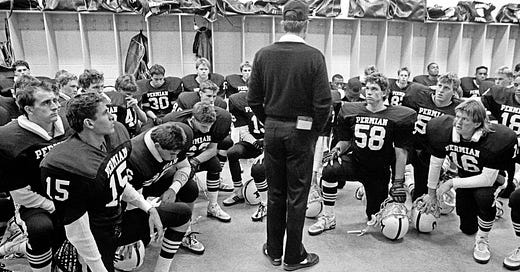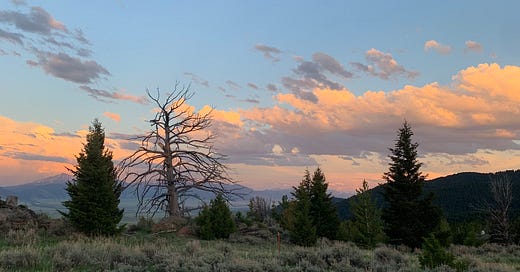

Discover more from Writing from Kate & Ali
📩 Letter #40: Your grandmother is not in the metaverse
Give real life a try. You might like it.
Dear Kate,
It couldn’t be a more beautiful day in Austin, Texas. The sky is unmarred by clouds, the air has the fresh smell of September. A cool breeze ruffles the pages of my library book. I’m writing to you from beneath an oak tree with tall, wide branches. Squirrels zip up and down the oak’s trunk. A neighborhood cat yawns and crosses its paws.
There’s so much beauty in the material world: The rustle of dry leaves, the orange incandescence of fall’s first Monarch butterfly. Who could imagine leaving all of this behind?
You’ll be dismayed—if unsurprised—to know that’s the primary goal for many of our nation’s wealthiest members. Mark Zuckerberg, personally worth $135.2 billion, employer of 58,000 people, is working on it. Satya Nadella, CEO of Microsoft, a company worth $2.2 trillion, is working on it. Tim Sweeney, CEO of Epic Games, personally worth $7.4 billion, is working on it. David Baszucki, founder of Roblox, a company worth $47.3 billion, is working on it. Unity, a company worth $37 billion, is working on it. Many, many venture capitalists, in charge of allotting further billions to fledgling startups, are working on it too.
They’re working on the metaverse, an immersive digital world. Here’s Mark Zuckerberg’s definition: “You can think about the metaverse as an embodied Internet, where instead of just viewing content — you are in it.”
The metaverse will be made possible with cooperation from all of the players I listed, through what Matthew Ball calls “unprecedented interoperability.” For once, everyone is on the same team: Trillions of dollars are lining up behind a common goal. In the metaverse, there will be no pandemic, they say. There will be no climate change. There will be only dreams.
Smart people are hard at work on justifications for the metaverse. Here are a few: 1.) It will offer new economic opportunities for people who make art and videos and music online. 2.) It will remove the burden of place from employment. 3.) It will allow connection in a fragmented world. 4.) It will solve “reality privilege.” 5.) The deepest, often unspoken rationale—perhaps the one we should take the most seriously—is this: The metaverse is happening, regardless, so we should prepare to make the most of it.
To me, each of those arguments is more concerning than the last, fertile ground for unintended consequences to bloom like mushrooms after rain.
I am no technologist, ethicist, or developer. Still, I have a stake in this future as much as anyone. This idea—life redefined by VR headsets or AR projections floating just past our eyes—matters. What we do with that idea matters too.
First, we know that when new technologies hit the mass market, adoption precedes obligation. Examples: If you can build an audience on Twitter, it will soon be a given that you should build an audience on Twitter. If you can make a TikTok dance, become famous, and buy cars worth more than your parents’ home, you should make a TikTok dance, become famous, and buy cars worth more than your parents’ home. If you can make yourself perfect—your face through custom skincare, your body through Peloton classes, your mind through meditation apps—you should do it, all of it. No matter the cost.
Consumer tech’s “opportunities” soon become our obligations. Ordinary people bear the burden of living up to “exciting” value propositions. When technology “democratizes access,” what was once unachievable becomes the default expectation.
Put another way by L. M. Sacasas: “We never go back.”
Can you imagine an obligation to plug into the metaverse? In the morning, you might be expected to pop on an Occulus Rift headset to show up for a work meeting. (Facebook’s new product, Horizon Workrooms, facilitates this.) After work, since you’re already online, you could stay in the metaverse to listen to concerts, watch movies, rock climb, or meditate. You could strap your kids into a headset and send them off to virtual daycare, too. The goal of the metaverse is to encompass everything: Work, life, friendships, all of it.
That’s a pretty sad picture. What about the scent of rosemary growing in my garden? What about the pink sunset beyond my front porch? If the economic incentives of the metaverse encourage trading these tangible experiences for a simulated digital reconstruction, it’s inevitable that our time in the real world will suffer.
Who will water the rosemary? Who will watch the sunset?
Here’s where a reader will email me: “Ali, calm down. The metaverse is an addition to our world, an option to make things better. It’s fun. You shouldn’t present it as a false choice.”
But I suspect the choice will be exactly that stark. The amount of money flowing toward the metaverse (and its surrounding technologies: VR, AR, gaming, crypto, etc.) ensures the impossibility of a middle route. There could be a path defined by moderation, humanity, and boundaries. We will never see it. Returns will be owed. Scale will be required. There will be no moderation.
As explained by a Silicon Valley founder: “Mark Zuckerberg doesn’t wake up every morning and say to himself, ‘Holy shit!—2.8 billion people use Facebook!’ Instead, he wakes up every morning and says, ‘Why isn’t the other half of planet Earth using Facebook?!’”
Journalists have raised questions over the technical achievability of the metaverse. I think that’s beside the point. These men, with billions to burn, have set their sights on it. Whether they achieve it or not, we’ll all be subject to years of PR campaigns, speeches, and CBS This Morning segments, extolling the virtues of living in a digital world. “We have disease here,” they will say of physical reality. “We have fires. Just slip on the headset, and it will all melt away.” Such promises—cloaked in the language of equitable access and economic opportunity—will become part of the water we swim in.
That’s a problem. As much as the possibility of a digital reality itself, the narratives around the metaverse represent some of the most concerning philosophies to emerge out of our fully online, post-pandemic lives.
Being in Place:
One such narrative is the abstraction of place. “The better that this technology for presence gets, the more you can live where you want,” Zuckerberg argues.
Here’s the pitch: In the metaverse, anyone could work for any company around the world. Digital avatars could shake hands and make eye contact online, meaning you would never have to fly to a job interview again (and neither would the hundreds of other candidates). The labor market would become more competitive, opportunities more abundant for all. Universities could admit students from anywhere, no dorm rooms required. Passports wouldn’t matter. Visas wouldn’t matter. Even timezones wouldn’t matter. The sun doesn’t affect someone wearing a headset.
With WiFi and VR, it wouldn’t matter where you lived: a studio apartment, a cabin in the woods, or a yurt on a mountain. Your children wouldn’t need residence in a particular zip code to attend public school. They could learn in a virtual classroom. You would be free to go anywhere, anytime, without consequences. You could always log back in, right where you left off.
Here’s the trouble: Our culture is fixated with the benefits of unlimited choice—living and working wherever we want—with little preparation to contend with the consequences.
Place is one of the most powerful tools we have to form meaningful social relationships. Before we met friends through Twitter, Fortnight, or Twitch, we met them on the playscape at school. We met them in parks, on sidewalks, or at neighborhood basketball games. We met them through the incidental encounters that happen when you roam a neighborhood with two feet. As Simon Sarris writes, “What creates strong friendships are repeated, tiny, and unplanned interactions.”
Zuck would argue that Facebook/Instagram/WhatsApp connect millions of people as “friends.” But in a neighborhood of 2.2 billion, loneliness is pervasive. Why? Relationships are about intimacy, not scale.
“Familiarity is crucially the maintaining of weak ties, or else the maintaining of strong ties in weak ways,” Sarris writes. “Some things can only be made strong by binding one thousand tiny threads.” Familiarity is in the mundane: borrowing a cup of sugar, nodding at the neighbor who waters his lawn each morning, petting a dog who is a regular at the park.
There’s familiarity, then there’s serendipity. Think about all those romantic comedy meet cutes from the ’90s: A man and woman simultaneously reach for the same book at a bookshop. A girl meets her crush riding the bus. A man gets lost, he stops to ask for directions, and falls in love.
How many of these wonderful, unplanned interactions have we eliminated with the ruthless efficiency of technology? No need to brush hands across a shelf when you can order on Amazon. Our opportunities for familiarity and serendipity—both facilitated by place—are gone. Algorithms, recommendation engines, GPS, and calendars intermediate our lives now.
Embracing the value of place might be our best tool to stitch a strained, fragmented society back together. For example, consider a trip to one of the last institutions firmly secured by geography: The public library.
You walk in the doors, and you’re greeted by a librarian. She waves. Inside, it smells clean, like books. Everything is inviting. There are comfortable chairs and thick rugs. You’ve chosen this library not because of its prestige, or its financial endowment, but because of proximity. It’s nearby.
On the wall, announcements are pinned to a board: A cooking class is coming up. It’s free, provided by the library. On Thursdays, a group meets to read a novel. If you’re looking for a project, the community garden needs volunteers.
At the library, you’ll meet strangers. You’ll have to work at making conversation; you will not have mutual interests pre-aligned by a dating app or Twitter thread. These strangers will be of different ages and different socio-economic backgrounds. All you’ll share is place.
Then, on a Thursday night, months after you joined the reading group, seated around a table holding borrowed copies of Great Expectations and paper cups of hot cocoa, you’ll wonder how it’s possible to love a group of strangers so terribly much. You will take from this experience, but you’ll also give.
Every day, the library offers the opportunity for chance encounters. A writing teacher once told me: “The book you need is right next to the book you’re looking for.” Without the convenience of efficiency, we have the possibility of delight.
A few comparisons:
1.) At the library, geography is both a unifying strength and a limiting factor. The number of people who can visit is capped. (There’s a reasonable limit to how far you’ll drive to visit a library.) This limit, paradoxically, is what allows it to be an open, public resource. It is free to anyone, but not to everyone. (A library in the metaverse would soon be trampled with a stampede of influencers, ready to lay claim to a cool space only to desert it later when the herd moves on.)
2.) The library is not a passive piece of infrastructure. It is not an open, public “town square,” as so many social networks purport to be. It has staff. Trained staff. Librarians actively care for the most vulnerable and marginalized. Librarians listen. Librarians accept responsibility. Someone is in charge; rules must be followed. It is not a place for chaos. Don’t follow the rules, and you get kicked out. (Can you imagine Zuck maintaining decorum, much less any international regulatory standard, in the metaverse?)
3.) Perhaps most critically, the library is free. You do not benefit by being rich at the library. You benefit by being kind.
So much of the metaverse is about extracting value: what can be bought or sold? Which Marvel characters can be produced as avatars? Which NFTs can be sold as digital artwork? Which musicians can sell digital tickets? How long can we keep people trapped here, consuming, consuming, consuming?
Place, of course, is rife with this thinking too: Where is real estate the most valuable? Where can I make the most money? Where can I pay the lowest taxes?
It’s also true that place is inherently unequal. Some places are rich, with better libraries, gardens, art, and universities. Some places are poverty stricken, troubled by crime, left defenseless against decay. In the U.S., those two places might be only miles apart. Around the world, 150 million people, half children, are expected to live in extreme poverty by the end of 2021. In many places, running water is a luxury. Toilets are for the affluent.
It’s this vast chasm that gives Marc Andreessen a basis to argue for the metaverse as an antidote to “reality privilege.” We’re not all privileged with a pleasant existence. In virtual reality, everyone can escape to a brighter future.
In response, I pose this question: If you went to your grandmother’s house and found it crumbling — the gutters full of trash, the sink dripping, mold growing along the bathtub, garbage spilling onto the kitchen floor — what would you do? Would you suggest she turn on the TV? Would you turn out the lights, plug in headphones, turn up the volume, and help her fade into a fictional world of characters she can meet but never touch? “She can see the world through TV!” you might argue. “It gives her joy!”
I suppose this is an option. A better option would be to help. Clean out the gutters. Fix the sink. Scrub away the mold, and take out the trash. Sit with her, hold her hand. Ask her if she’s okay. Open the curtains, plant seeds in the garden, and wait for the butterflies.
In a small place, in your grandmother’s house, it does not take a Silicon Valley billionaire to change the world.
It just takes you.
What would the world look like if we always considered place from this perspective? What if we disposed of Silicon Valley’s “scale at all cost,” “systems thinking,” “macro” approach, and instead took up Wendell Berry’s philosophy: What if we think little?
A bed of flowers in the front yard. A wave hello. An extra cup of coffee, offered to a stranger. One little deed at a time, we can make things better.
We can embrace the restrictions of physical place. We can embrace friction, commitment, and responsibility. We can choose to be together for only the sake of being together, and through that choice, turn even the most desolate of places into butterfly gardens.
From Sarris again, “All worthy places were once unworthy, after all.”
My Book rec: Second Nature
The book: Second Nature
Why you should read it: I think I’m in a romantic relationship with Michael Pollan? To be clear, I’ve never met him. But he’s so detailed and revealing — in this case writing with intimate precision about a decade’s worth of maintenance on a small plot of land in Cornwall, Connecticut — that I feel we are intertwined.
Other things you should read: His essay on lawns. It’s… poetic?
Subscribe to Writing from Kate & Ali
Links & excerpts from two writer friends, Kate Lucky & Ali Montag.














Ali, This is a remarkable essay. There are so many compelling notions in this piece I will have to re-read it a few times. Your example about what to do upon finding grandmother’s house in disarray is particularly acute.